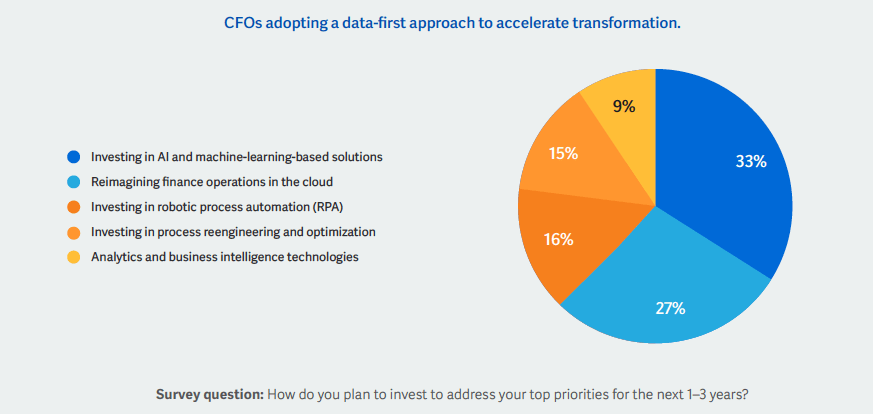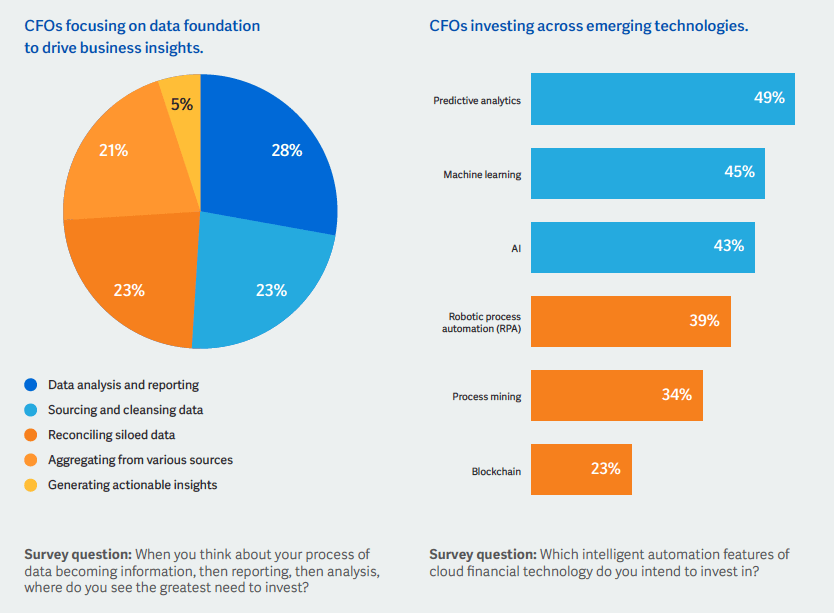
Digitisation, data and Covid are shaping today’s business world – each demanding financial investment and the CFO’s time. Technology provider Workday says the role of finance is changing fast, but so too are the skills of those at the helm of finance departments.
About a century or so ago, fictional British detective, Sherlock Holmes said: “It is a capital mistake to theorise before one has data.” The word “data” has its origins in Latin but has likely never been as popular as it is today.
It’s the source of multimillion, even billion, dollar decisions; it drives operations; it’s even a commodity of its own. And for the past few years it has been at the very heart of governmental decision-making as the world grapples with the Covid pandemic.
For CFOs, data is fast becoming the pre-eminent tool of choice. But it isn’t just the finance department of today’s businesses where data is having an impact, it’s a valuable resource in human resources (HR), operations, marketing and many more disciplines.
“An organisation’s insights are only as good as its data, and the ability to make data-based decisions is only as good as the quality, completeness and accessibility of that data,” says Workday, a leading provider of enterprise cloud applications for finance and HR.

Founded in 2005, the US-based solutions provider has a presence globally, servicing clients ranging from medium-size businesses to some of the world’s leading enterprises, educational institutions and government agencies. Among the company’s objectives, it wants to allow its customers to break free of the dated silo model of data generation and utilisation to one that “brings financial, people and operational data into one unified core that’s always live and always secure”. To do this it believes that trust and transparency is key.
Future proofing
Workday has a vision that is fast becoming one shared by CFOs and the organisations they work for: the adoption and acceleration of digital technologies to future-proof the business for tomorrow, and be the best it can today. In a recent survey, Workday says half (49%) of over 260 CFOs said their ability to execute informed decisions with accurate, timely data had been hindered. An equal number said data management and analysis was a top priority in the next three years.
“The finance function is accelerating a shift that was already underway, with a focus on data – in terms of collection, access and analysis – to provide even greater value to the business,” it says. However, it adds the past year has served to reaffirm the importance of timely, decision-ready data for enterprises to accelerate growth and transform ways of working – citing the pandemic as a key driver.
The need to transform is more pressing than ever before, according to respondents. More than half (52%) said not having the necessary data to make critical business decisions had led to delayed product launches and even missed financial forecasts.
In response, nearly two-thirds of CFOs (60%) are investing in reimagining finance operations in the cloud and deploying artificial intelligence (AI) and machine learning (ML) solutions. It was also found that predictive analytics were the most sought after automation capability for 50% of CFOs.
Workday says finance professionals have recognised the need to prioritise internal investments accordingly. “In 2020, half of CFOs reported having invested in an intelligent data foundation and advanced analytics to improve decision-making across the enterprise,” the survey’s report concluded, adding that the digital transformation of finance departments is largely underway to some extent, in businesses both large and small.
That transformation involves incorporating day-to-day processes, predicting outcomes and providing real-time insights on-demand. A key piece of the puzzle is a financial management system built on a singular data platform that facilitates both granular transactional reporting and higher-level business insights.
“More than one-quarter of enterprises are near the beginning of their digital transformation journey,” Workday reports. “According to the CFOs in the survey, more than three-quarters of finance teams are undergoing some form of digital transformation.”
Preparing for change
As the use of data and the digitisation of operational functions changes enterprise, shifting too is the role CFOs and their finance teams play. Gone are the days when these individuals alone would be the bastions of spreadsheets and figures, or the go-to colleagues for number crunching.
Today, they are key stakeholders in the adoption of digital technologies. Workday says its findings show that CFOs are focused on informed decision-making and providing information to employees, which indicates the expanding role they have in data governance.
It adds that CFOs are prioritising a “change-ready culture” as the second-largest investment area. This, it continues, is a shift that requires an organisation to transform from within. It must be people-centric, and include employee training and upskilling, talent strategies and the modernisation of existing infrastructure to support new ways of working. “Put another way, a change-ready culture helps ensure that investments in data, technology and processes are fully leveraged.”
On the question of whether companies were responsive to this need, the survey found that many were, with a third (32%) saying they are actively investing in it. It’s a figure that Workday says shows businesses understand the value in upskilling teams and deploying modern financial management systems, even when they’ve already made progress in these areas. “55% of CFOs say their organisations have at least a few departments fully transformed, meaning they have adopted automated processes, AI and ML.”
AI and ML fast become investment hot property for the CFO, so too is cloud-based technologies. Of those questioned, a third (33%) said they were making AI and ML-based solutions budgeting priorities. 27%, for their part, said they were funding finance operations in the cloud.
“By leveraging cloud technologies,” Workday says, “businesses can ensure that employees are working with the same data and collaborating in real time.” It adds the cloud provides access anywhere and anytime, the importance of which became “abundantly clear during the pandemic and will remain vital in the new world of work”.
On the matter of ML, Workday says frictionless finance – using automation and ML to eliminate what it calls “tedious manual tasks” from core finance processes – is how enterprises will evolve in future, creating data-driven strategies to meet future challenges. Almost three in ten respondents said they believed these technologies could help them better analyse data and report on it – an area that is in need of greater investment.
“The pressure on finance to deliver insights to the wider business means there is a greater need for accurate analysis and reporting,” says Workday. Therefore, it’s no surprise that 49% of CFOs questioned said they planned to invest in predictive analytics, 45% in ML and 43% in AI in order to create predictive insights with large data volumes and deliver on the need for real-time analysis and reporting.
Summing up on the issue of AI and ML, the report says: “To improve the access to and management of data, CFOs have heavily invested in AI and automation. At the core of this is the need to future-proof finance operations, with AI and ML-based solutions helping finance functions contend with ever-increasing data volumes and analysis requirements.”

Taking the enterprise with you
Clearly CFOs have several big investment priorities, including data and technological transformation. They also understand that as their organisation transitions, so too must its practices and human capital in which it invests; it’s a holistic, multi-layered evolution encompassing almost every aspect of the business. That is where the change-ready culture is so critical. CFOs are looking beyond conventional policies of yesteryear, towards pioneering ones for the economy of tomorrow.
Having access to timely and accurate informationl for making decisions and analytics that provide real-time insights into business performance will be increasingly crucial to remain competitive, Workday says. But just as critical is having the talent to intemperate that information, and innovation to apply it.
The report says that while new technologies are crucial, organisations are simultaneously gearing up for a new era that places emphasis on environmental, social and governance (ESG) factors too, diversity and inclusion (D&I) programmes, and a renewed attention to employee training and skills development.
All issues were seen as key to a significant number of those questioned, reflecting the evolving corporate landscape of today; 29% identified ESG as a top concern, followed by D&I at 26%.
However, today’s tech savvy businesses can even use innovation in this sphere according to Workday: “Cloud-based systems for finance and human capital management could potentially play an important role in measuring and managing ESG and D&I programmes and initiatives,” it says. It adds that a collaborative culture supported by information sharing and reporting, along with an end to disparate teams and departments, appears to be on the horizon.
“From our survey, it’s clear that data is a significant focus for finance leaders and a key priority in digital transformation. This looks likely to remain a priority for the next one to three years,” concludes the survey’s report. CFOs, however, acknowledged that simply having that data was not enough in the battle to stay ahead of their competitors.
Being able to gather it, decipher it and use it in any meaningful way is essential. Half of all those questioned agreed that data management and analysis are the most important elements in terms of digital transformation priorities.
“Curating the right data and turning it into actionable insights that are well organised, easily understood and shared with the right stakeholders remains important for digital acceleration,” Workday says. It notes that keeping up with volume and velocity of data is vital, requiring the right solutions.
Collectively, a staggering 59 zettabytes of data were created in 2020. “Without the right intelligent data platform in place,” warns Workday, “the finance function can find itself relying on siloed data that fails to provide a holistic view of the organisation.”
Concerningly the survey revealed that finance teams do not always have the data platforms in place to meet business demands. Workday says that when asked which areas CFOs need to make additional investments in order to better turn data into analysis, respondents said sourcing and data cleansing (23%), reconciling data silos (23%) and data aggregation from multiple sources (21%).
Finally, Covid has had an impact on the way business is done – and the organisations that do it. Aside from the obvious detrimental consequences, the pandemic has at least helped hasten digital change. As organisations have developed ways to adapt, Workday says they’ve discovered the value of cloud technology, integrated data and more aligned finance processes. It adds the events of recent years have shown that speed and agility will continue to be key in post-pandemic recovery, and the need to close the gaps with data-driven decisions, process automation and effective change management.
“By adopting a data-first approach, organisations can bolster important business decisions, reduce risk and accelerate transformation. The right financial system can automatically enrich and transform business event data into accounting entries and deliver real-time insights to drive business strategy and growth,” the solutions provider concludes, adding that “intelligent financial management software saves money for the business by reducing costs and increasing quality, making business processes frictionless and much more efficient”.






